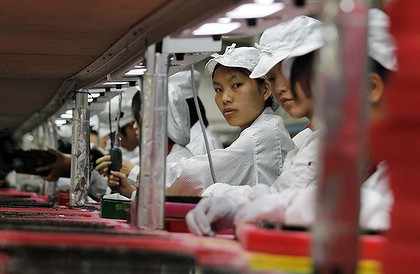Video:
http://www.ted.com/talks/leslie_t_chang_the_voices_of_china_s_workers.html
Leslie T. Chang: The voices of China's workers
Hi. So I'd like to talk a little bit about the people who make the things we use every day: our shoes, our handbags, our computers and cell phones. Now, this is a conversation that often calls up a lot of guilt. Imagine the teenage farm girl who makes less than a dollar an hour stitching your running shoes, or the young Chinese man who jumps off a rooftop after working overtime assembling your iPad. We, the beneficiaries of globalization, seem to exploit these victims with every purchase we make, and the injustice feels embedded in the products themselves. After all, what's wrong with a world in which a worker on an iPhone assembly line can't even afford to buy one? It's taken for granted that Chinese factories are oppressive, and that it's our desire for cheap goods that makes them so.
So, this simple narrative equating Western demand and Chinese suffering is appealing, especially at a time when many of us already feel guilty about our impact on the world, but it's also inaccurate and disrespectful. We must be peculiarly self-obsessed to imagine that we have the power to drive tens of millions of people on the other side of the world to migrate and suffer in such terrible ways. In fact, China makes goods for markets all over the world, including its own, thanks to a combination of factors: its low costs, its large and educated workforce, and a flexible manufacturing system that responds quickly to market demands. By focusing so much on ourselves and our gadgets, we have rendered the individuals on the other end into invisibility, as tiny and interchangeable as the parts of a mobile phone.
Chinese workers are not forced into factories because of our insatiable desire for iPods. They choose to leave their homes in order to earn money, to learn new skills, and to see the world. In the ongoing debate about globalization, what's been missing is the voices of the workers themselves.
Here are a few.
|
Bao Yongxiu: | "My mother tells me to come home and get married, but if I marry now, before I have fully developed myself, I can only marry an ordinary worker, so I'm not in a rush."
|
|
Chen Ying: | "When I went home for the new year, everyone said I had changed. They asked me, what did you do that you have changed so much? I told them that I studied and worked hard. If you tell them more, they won't understand anyway."
|
|
Wu Chunming: | "Even if I make a lot of money, it won't satisfy me. Just to make money is not enough meaning in life."
|
|
Xiao Jin: | "Now, after I get off work, I study English, because in the future, our customers won't be only Chinese, so we must learn more languages."
|
All of these speakers, by the way, are young women, 18 or 19 years old.
So I spent two years getting to know assembly line workers like these in the south China factory city called Dongguan. Certain subjects came up over and over: how much money they made, what kind of husband they hoped to marry, whether they should jump to another factory or stay where they were. Other subjects came up almost never, including living conditions that to me looked close to prison life: 10 or 15 workers in one room, 50 people sharing a single bathroom, days and nights ruled by the factory clock. Everyone they knew lived in similar circumstances, and it was still better than the dormitories and homes of rural China.
The workers rarely spoke about the products they made, and they often had great difficulty explaining what exactly they did.
When I asked Lu Qingmin, the young woman I got to know best, what exactly she did on the factory floor, she said something to me in Chinese that sounded like "qiu xi." Only much later did I realize that she had been saying "QC," or quality control. She couldn't even tell me what she did on the factory floor. All she could do was parrot a garbled abbreviation in a language she didn't even understand.
Karl Marx saw this as the tragedy of capitalism, the alienation of the worker from the product of his labor. Unlike, say, a traditional maker of shoes or cabinets, the worker in an industrial factory has no control, no pleasure, and no true satisfaction or understanding in her own work. But like so many theories that Marx arrived at sitting in the reading room of the British Museum, he got this one wrong. Just because a person spends her time making a piece of something does not mean that she becomes that, a piece of something. What she does with the money she earns, what she learns in that place, and how it changes her, these are the things that matter. What a factory makes is never the point, and the workers could not care less who buys their products.

